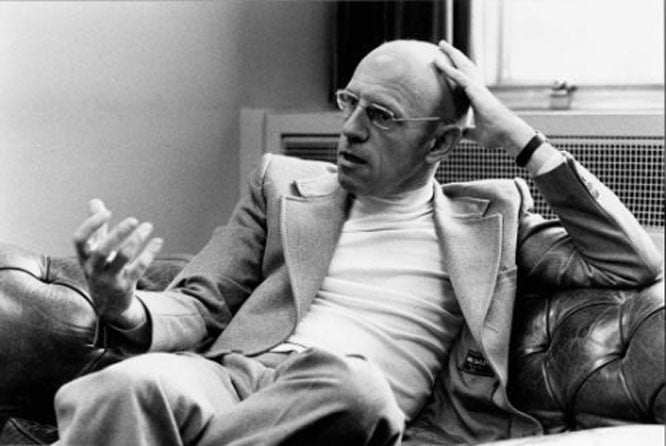
An inconclusive debate on History

Recently, at the faculty lounge of GCU’s history department, young historians expressed concern over why people show indifference to the discipline of History. They said although many educated Pakistanis acknowledge the importance of History, they play down the significance of professional historians. They were disturbed about their status in society, which is impervious to the Foucaldian postulate that links power with knowledge. In such a society, people entrusted with the task of imparting knowledge are rendered superfluous.
Ayyaz Gull asserted that much of Michel Foucault’s philosophy hardly has any relevance in Pakistani society. Nayyar Abbas and Mohsin dismissed Ayyaz’s claim as far too loaded, and wanted a more profound and incisive unravelling of that intellectual tangle. But Ayyaz did not give in, and argued that the importance of History usually wanes in societies and nations that repose belief in an ideology that claims universality with sternest equivocation.
He asserted that this is the reason why Pakistanis treat history with indifference -- because they are ideological in their collective orientation. Ideology comes to a pass when a historical moment is frozen in time -- therefore, ideology and history are antithetical to each other. When a historical moment negates its most essential property, which is its unceasing flow, the ideology with its universal claim, comes into existence. Obviously people seek solace in universal ideas. Historical course with its exhausting dynamism may make life an unending process of adaptation to the newly emerging situation(s).
Having said all that, Ayyaz looked around triumphantly but, to his dismay, the discourse was far from over -- rather it took a profounder turn.
Nayyar brought in Hegel and Karl Marx, and spun his argument with the aid of their respective philosophical framework(s). In these philosophical giants he saw historical dynamism and universality. Hegel, like Plato, propounded idealism, which subscribed to nothing but universality. Continuous unfolding of the absolute idea (a universal entity) epitomised the Janus-faced phenomena, universality and dynamism. Through dynamism, universality was to be achieved.
Historical materialism of Karl Marx if analysed incisively encompasses both, whom Ayyaz had termed as binary opposites of each other.
By a dynamic force of history, Marx envisaged to achieve an ideal, the class-less society which would have evolved itself to be administered by a state. The process leading to that ‘destiny of human race’ is a universal phenomenon.
The third personality That Nayyar put forth to drive his point home was Iqbal. In his thoughts, the interplay of both universality and dynamism figure very prominently. The hackneyed method of reading history through binary opposites prevents us to look deeper into the historical process which is infinitely complex.
Ayyaz did not find this too amusing. How come these theoretical fiddlesticks centring on Hegel and Marx explain the aversion of Pakistanis from history, he retorted. That was an altogether a different question, Nayyar responded while sipping his tea.
I tried to underscore the fact that universality and historical dynamism can co-exist. Even within a larger phenomenon of universality, historical dynamism may continue to proceed.
Mohsin interceded at this point. According to him, universality can be attributed as a core property of historical dynamism. That turned the discussion upside down. But the fact that such a debate took place in the History department of GCU in Lahore is commendable.
We returned to the discussion on the state of history again later the same day. I was cognizant that the simplest question is usually the hardest to answer. I told them that Pakistan does not have a consensually agreed upon national history. Generally, in most countries, national history is put together at the behest of the state, sometimes explicitly and at times implicitly. In response to that national history, counter historical narratives in the form of regional or cultural histories emerge.
Read also: Dialect of our history
In the case of Pakistan the opposite has happened where counter-historical narratives have sprung up while the unanimously agreed upon national history has yet to take a definitive shape. In my view that may be the reason the disconnect between people and history as a discipline is so stark.
But more importantly our connection with our past is mired in sheer ambivalence. Religion is used as a prism through which we view our past. As a result, plurality has been banished from our history books.
Here, Ayyaz had a point, that ideology with universal claim usually has an ominous rub on history. The past for many Pakistanis is badly fractured and has its vivid reflection on the historical discourse. The starting point of our national history is beset with a lack of unanimity. Is it 711, 1857 or 1947? People on the peripheries should also be included in our national historical discourse -- Gilgit Baltistan, Waziristan, regions of Khyber Pakhtunkhwa and Balochishtan are excluded from the national history. Persian language is relegated to insignificance and the relationship with the past through history has been enfeebled as a consequence.
Young historians listened to me but were not convinced entirely. One of them referred to some of my writings where I had argued quite otherwise. Hence, the debate on history remained inconclusive. However, I am sure about one thing --that the debate will continue because we have a bunch of vibrant historians.